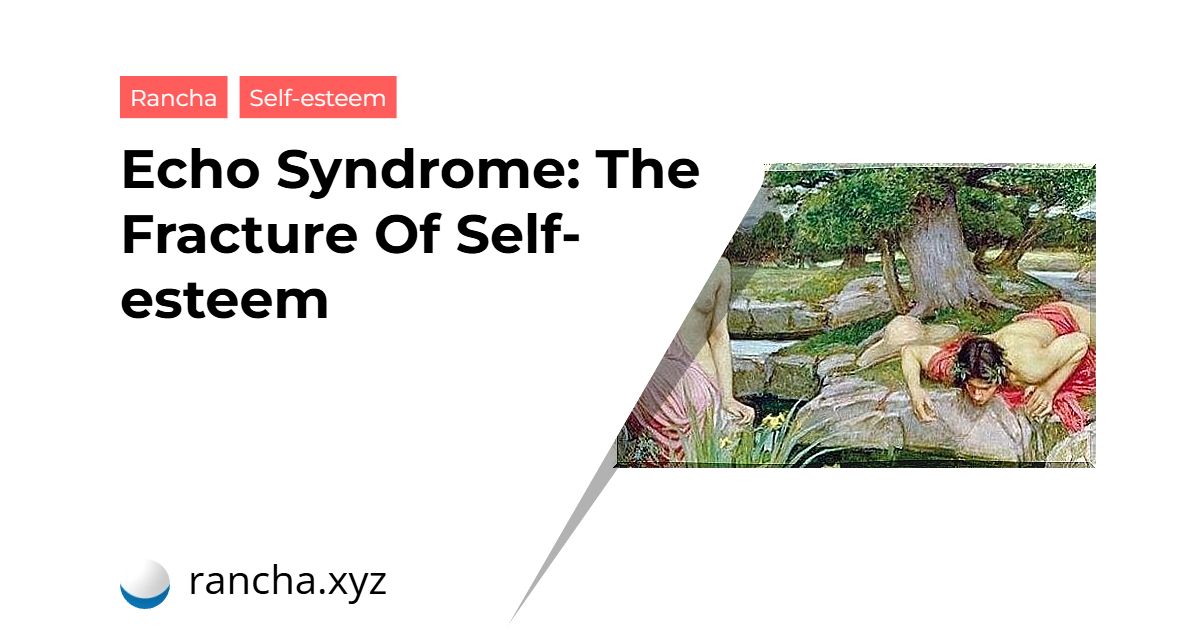Echo’s syndrome has its origins in the mountain nymph who, chastised by Hera, repeated the last words of every conversation. Today, this mythological figure symbolizes many of those people who struggle in their daily lives to have their own voice, to be visible… something they almost never achieve because they are so close to a narcissist.
One of the most recent terms in the field of psychology is, without a doubt, ecoism . Although the root of this term may evoke ideas related to the environment, in reality this dimension has its roots precisely in the story of Monte Helicón in love with a beautiful shepherd named Narciso.
It was Dr. Craig Malkin, professor of psychology at the Harvard School of Medicine and clinical psychologist, who first introduced the word ecoism in the book “ dealing with
Ecoism makes visible the part of the population that somehow lives under pressure or conditioned by a narcissistic figure. They are affectionate and emotionally sensitive people, but they feel a great deal of discomfort when they are the center of attention.
They are afraid to express their needs and prioritize those of others; they are passive profiles and not very assertive due to pressure from a partner, parents or an environment inhabited by narcissism.

Echo Syndrome: origin and characteristics
Over the next few years, we’ll hear about this term often. The Echo syndrome arouses more and more interest among the public because narcissistic behavior (and its effect) extends visibly in our surroundings.
Studies carried out at the University of Bochum (Germany) and published in the Public Library of Science magazine highlight that social networks allow us to see this increase.
There are many people who feel that in their daily lives this type of profile tends to limit their identity and, above all, their self-esteem. On the other hand, if we analyze the Eco myth itself, we will notice a singular aspect. This nymph was the most assertive and brilliant when it came to conducting a conversation. Everyone marveled at his oratory, grace and talent with words.
So much so that Zeus himself used it to entertain Hera while taking the opportunity to be with other women. So, on the day the goddess realized the lie, she punished the nymph by removing her voice. All she could do was repeat the last words of the others.
However, it could be said that Echo’s biggest torment came when she fell in love with Narcissus and he laughed at her for her unique trait.
It was then that she fell into the deepest sadness. The rejection and humiliation were more painful than losing your voice. Ecoism integrates this very essence. All of us could have been skillful people, brilliant and strong in terms of psychological values in the past. However, the presence of a narcissist can completely nullify us at any time and lead us to the cave of Monte Helicón where Eco took refuge.

What is a person with Echo syndrome like?
Echo syndrome does not only define a person with low self-esteem or even a dependency problem. This psychological reality is more complex.
- They are people with great emotional sensitivity.
- They know how to listen to others, they are very empathetic. However, they are not comfortable or safe expressing their needs to others.
- They do not appreciate its value and rarely acknowledge its achievements.
- They are those people who don’t take initiatives because they don’t want to bother others, who refuse projects if they believe they might cause some kind of annoyance or problem for others.
- Echo’s syndrome usually has its origins in a childhood in which one of the parents had a narcissistic personality. Your emotional and personal needs have been neglected and even denied.
- There is a crucial aspect that also defines these people: they are very aware of what happens to them . They have great internal struggles, try to impose themselves, seek to regain their voice, set limits and make their needs clear. However, they do not always achieve this, resulting in constant internal conflicts.
- In turn, it is common for ecoists to maintain affective relationships with narcissists. There is a feedback between the two profiles, in which some nurture and others receive, and there is rarely fullness or real satisfaction in the couple.

Is Echo syndrome a psychological disorder?
Echo syndrome is not a psychological disorder. This is an aspect that should be made clear. Ecoism is just a trait, a feature that forms a kind of survival mechanism not very useful and can be summarized as follows: “if I want to be safe and receive affection, I should ask for as little as possible and give everything I can” .
This idea is articulated by the effect of a childhood based on this kind of insecure attachment in which a narcissist buried all of the child’s emotional needs. Little by little they learn not to have a voice, to live in silence, not to worry excessively, but to be the key figure so that other narcissists can show off.
We can all emerge from these personal caves. Echo used Nemesis to exact revenge, but it’s not necessary to reach these extremes. Because the punishment Narcissus received did not help the nymph regain her oratory, her wonderful ability to communicate through the gift of speech.
All it takes is working on self-esteem, understanding that we deserve to be visible, have a voice, express needs and nurture ourselves with affection and dignity. After all, sometimes it’s also not bad to do like that handsome guy and look at our reflection to remember how much we’re worth.
 rancha.xyz Be free to choose their own route to self-knowledge, health and balance of body and soul.
rancha.xyz Be free to choose their own route to self-knowledge, health and balance of body and soul.




